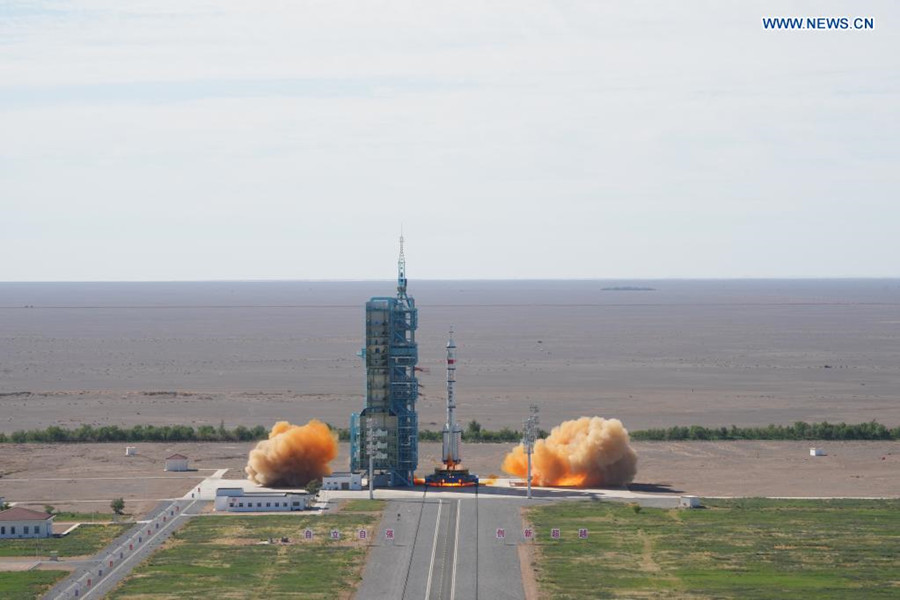
The crewed spacecraft Shenzhou XII, atop a Long March-2F carrier rocket, is launched from the Jiuquan Satellite Launch Center in Northwest China's Gobi desert, June 17, 2021. [Photo/Xinhua]
This is an editorial from China Daily.
A new milestone was reached in the country's space exploration cause on Thursday morning, when the spacecraft Shenzhou XII with three astronauts aboard blasted off the launchpad in Jiuquan, Gansu province.
In the afternoon, the spaceship successfully docked with Tianhe, making the astronauts the first visitors to the core module of the space station that was sent into low-Earth orbit in late April. The country's first manned mission in nearly five years, and the longest manned mission so far, it is a key step toward the completion of China's space station Tiangong.
The module has living quarters for three crew members, and the astronauts are due to stay there for three months. During their stay they will test and maintain the onboard systems, conduct spacewalks and undertake scientific experiments.
It was from Jiuquan that China sent its first artificial satellite into space 51 years ago. Since then, generations of scientists, engineers and scientific workers have contributed to the progress of the country's aerospace cause.
The harsh research and living conditions during the early days of the country's space endeavors and the developed countries' sanctions on technology and equipment only served to spur them to make breakthroughs in one key technology after another.
It is the pioneering spirit of their predecessors and their example of hard work, perseverance and self-sacrifice that have motivated newcomers to continuously strive to make new achievements. And it is thanks to the dedication of these scientists and engineers and others involved in various capacities that the country has managed to overcome the tremendous difficulties it has faced along the way.
The Chinese people firmly believe that having the ability to explore outer space, or the final frontier as it is known, is a responsibility that any country with the technological capabilities should shoulder, as it can contribute to the common good of all people and help deepen our understanding of the cosmos.
Believing the outer space provides a new realm for international cooperation, China's space endeavors are not exclusive and it always keeps its door open to international cooperation.
In 2019, China and the United Nations jointly released a list of the first nine international cooperation projects for China's space station, which involved 23 entities from 12 countries in the fields of aerospace medicine, space life sciences and biotechnology, microgravity physics and combustion science, astronomy and other emerging technologies.
Shenzhou XII, China's seventh manned space mission since 2003, represents a comprehensive test of these advanced technologies, as well as new materials and China's management of complicated space missions, and it will help the country accumulate valuable firsthand experience for future missions.
We offer the three astronauts and all those involved our best wishes for a successful mission, and we look forward to welcoming the astronauts home on their safe return in October.
It is also hoped that the bravery, wisdom and commitment they embody can inspire more young talents to join the lofty cause and set the vastness of space as the stage to realize their ambitions and the country's dream of national rejuvenation.

 中文
中文





